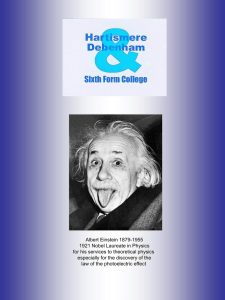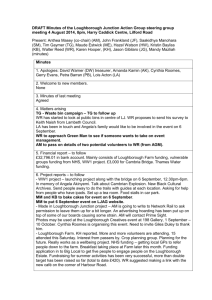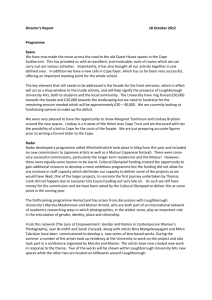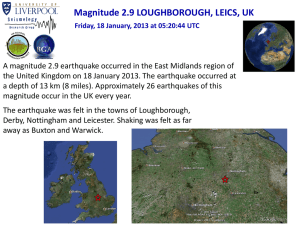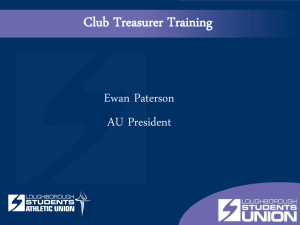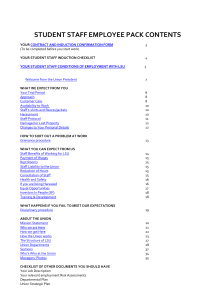Safety I
advertisement
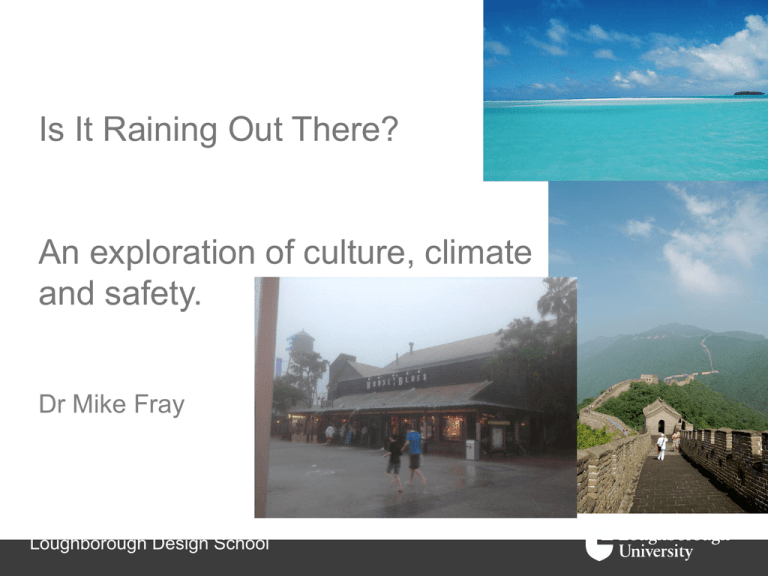
Is It Raining Out There? An exploration of culture, climate and safety. Dr Mike Fray Loughborough Design School Overview Culture and Climate Safety I and Safety II Resilience Indicators for improvements Loughborough Design School Few phrases occur more frequently in discussions about hazardous technologies than safety culture. Few things are so sought after and so little understood James Reason, 1997 Loughborough Design School Exploring socio-technical systems approach Delivery of healthcare services via complex integrated systems Systems Models: SEIPS 1.0 and SEIPS 2.0 (Carayon et al 2014), Dial F Model (Hignett 2013), Dynamic risk and safe performance (Rasmussen1997) Consider: Role or absence of patient (Mitchell et al 2014) Active vs passive Compliant vs non-compliant Treatment or rehabilitation (Boltz et al, 2012) Loughborough Design School Culture is: Emerges through a social process Staff attach meaning to policy, practice and behaviour Values, beliefs, assumptions Created through story, myth and ‘believed success’ Is interpretive Loughborough Design School Waterson, 2014, Healthcare Foundation, 2013 5 Climate is: Right here right now. Measureable, observed Process, practice and behaviour Influenced by organisational culture Influenced by organisational procedures Influenced by individuals at the coal face Loughborough Design School 6 Characteristics of a Safe Culture Managers engage with safety Regular clear information on safety Can raise concerns and will be listened to Safety is always a top priority Investigates all accidents and incidents Loughborough Design School 7 HSE 2002 Characteristics of a Safe Culture Equipment and training is available if required Everyone is involved in decision making Rare for people to take short cuts Honest and open about safety Morale is generally high Loughborough Design School 8 HSE 2002 Consider these items against your organisation in healthcare, social care, education, community care? Loughborough Design School 9 Characteristics of a Safe Culture (For Patient Handling) Managers engage with safety (???) Regular clear information on safety Can raise concerns and will be listened to (???) Safety is always a top priority (Against all other priorities) Investigates all accidents and incidents Equipment and training is available if required Everyone is involved in decision making Rare for people to take short cuts(???!) Honest and open about safety Morale is generally high(?) Loughborough Design School 10 HSE 2002 Patient Handling Safety Performance TROPHI (Fray and Hignett, 2013) Loughborough Design School Outcome Rank Safety culture 12 MS health measures 11 Competence compliance 10 Absence or staff health 9 Quality of care 8 Accident numbers 7 Psychological well being 6 Patient condition 5 Patient perception 4 MSD exposure measures 3 Patient injuries 2 Financial 1 11 Culture to Climate Organisational behaviour measures (1) Measures of safe or quality behaviour (3,5,6) Loughborough Design School Measures of effects on individuals (2,4,7,8,9,10,11) Financial outcomes (12) Are we measuring Culture? Fray Waterson Munro (in press) Sextons Safety Culture Tool (SAQ) Vs TROPHI (IHI 2012) OM SCM SCScore % +ve 0.50 0.20 0.20 0.20 1 Safety Climate 0.90** 0.70 0.70 0.70 2 MS Health Measure 0.60 0.70 0.70 0.70 3 Competence & Compliance 0.10 0.00 0.00 0.00 5 Quality of Care -0.21 -0.10 -0.10 -0.10 7 Psychological well-being 0.60 0.70 0.70 0.70 8 Patient Condition 0.90** 0.70 0.70 0.70 9 Patient Perception -0.20 -0.60 -0.60 -0.60 TROPHI Total Loughborough Design School 13 Are we measuring Culture? Fray Waterson Munro (in press) Sextons Safety Culture Tool (SAQ) Vs TROPHI (ICH 2012) OM SCM SCScore % +ve 0.50 0.20 0.20 0.20 1 Safety Climate 0.90** 0.70 0.70 0.70 2 MS Health Measure 0.60 0.70 0.70 0.70 3 Competence & Compliance 0.10 0.00 0.00 0.00 5 Quality of Care -0.21 -0.10 -0.10 -0.10 7 Psychological well-being 0.60 0.70 0.70 0.70 8 Patient Condition 0.90** 0.70 0.70 0.70 9 Patient Perception -0.20 -0.60 -0.60 -0.60 TROPHI Total Loughborough Design School 14 Options to consider Paper systems vs actual practice Management Commitment Work as perceived vs work as done What makes a successful transfer How do we measure the outcomes of safe patient handling Are we creating positives or avoiding negatives? Loughborough Design School 15 What might the chart represent? The slice of the chart represents 1 in 10 000 actions Loughborough Design School 0.0001% Accidents vs safety work 16 Accidents vs safety work Successful transfers Against Serious errors Loughborough Design School 17 Safety I vs Safety II Safety I Accident causation Understand what goes wrong Avoid errors Reduce losses Safety I and Safety II, Erik Hollnagel. (2014) Loughborough Design School Safety II Understand what goes right Repeat what goes right Enforce successful behaviours Develop the ability to create new process on successful behaviours Gains Comfort Good position Dignity Perceived safety of patient Efficiency Rehabilitation Clinical gains/maintenance 18 Safety and Resilience Oxford English Dictionary Recoil or spring back into shape Withstand or recover quickly from difficult conditions Organisational Resilience (Vogus and Sutcliffe 2007) ‘positive adjustments under challenging conditions’ ‘vitally prepared for adversity which requires improvement in overall capacity’ Concept of ‘Brittleness’ (Prof Woods, Ohio State) Boundaries of performance Graceful extensibility Sustained adaptability Loughborough Design School 19 Rasmussen’s Dynamic Risk Model (1997) Outline Operating Point Acceptable Performance Unacceptable workload Boundary to economic failure Loughborough Design School 20 Patient Handling Risks (NBE 2014, Gallagher 2012) Responses: 1. Increase infrastructure 2. Increase staff numbers 3. Do nothing Loughborough Design School 21 Patient Handling Safety Climate Fray Waterson Munro (in press) Observed Intervention Measures. Communication systems, supervision, education and training, safe equipment and environments Perception of Effectiveness. Recording the responses of all affected by the process, managers, supervisors, staff and patients 'Patient Handling Climate' Outcome Measures. Specific measures showing the effects of the process e.g. levels of incidents, musculoskeletal losses, quality of care measures, productivity, throughput etc . Loughborough Design School 22 Looking wider for possible solutions. Ergonomics and Human Factors Short courses. Human Factors Concordat (2012) Health Education England (2015) Other providers MSc Ergonomics (Health and Community Care) Certificate, Diploma, Masters Accreditation for Back Care Management Update modules for all. Loughborough Design School 23 Ergonomics and human factors has some answers but as Johnny Nash once said ‘There are more questions than answers’ M.J.Fray@lboro.ac.uk Loughborough Design School
